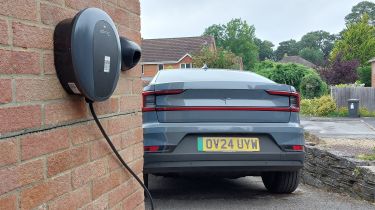October energy price cap makes charging an EV 10 per cent more expensive
The average driver will now pay roughly £1.30 more to charge their car at home, or as much as £27.30 extra per year

The cost to charge an electric car at home has jumped by as much as 10 per cent overnight after Ofgem’s revised energy price cap has come into effect, forcing EV drivers to reach even deeper into their pockets while petrol and diesel prices have recently fallen to their lowest point in three years.
Under the new price cap, which is effective from 1 October until the end of this year, the maximum price per kilowatt-hour of electricity has risen from 22.36 pence to 24.50 pence, not to mention the marginally increased daily standing charge, which now sits at almost exactly 61 pence per day.
While the increases per kilowatt-hour may seem trivial, it does mean EV owners will be forking out a lot more to charge their vehicles over time. For example, the UK’s best-selling electric car in 2023, the Tesla Model Y RWD, utilises a 60kWh battery pack with a usable capacity of roughly 57.5kWh. At the old rate, a full charge cost owners around £12.86, however, with the increased energy price cap, the same charge now costs more than £14.
For a car with a smaller battery such as the Fiat 500e, the difference isn’t as substantial; a full charge of the Fiat’s 42kWh (37.3kWh usable) battery used to cost around £8.34, while now it’s only slightly more at £9.12. However, for long-range EVs with big batteries, the increase is certainly noticeable; the cost of charging the seven-seat Kia EV9 SUV’s 99.8kWh (96kWh usable) battery pack has jumped overnight by more than £2 from £21.47 to £23.52.
Data from car finance firm Carmoola suggests that the average EV driver consumes about 108kWh of electricity each month to charge their car. That means they will be paying almost £2.30 extra per month to charge up, or the equivalent of £27.30 per year.
It’s worth mentioning that the newly raised energy price cap should not have any effect on the price of public charging – although, given that this still demands the full 20 per cent VAT rate, a further increase would likely come with huge backlash.
Carmoomla’s CEO, Aidan Rushby, described how the price cap has a “very real effect on the lives of households across the UK, especially as we approach winter and energy consumption rises”.
“As the 2030 ban on the sale of new petrol and diesel cars approaches, and more EVs hit UK roads, Brits will see their energy bills further influenced by their vehicles' charging needs,” Rusby continued. “Although electricity prices still remain cheaper than petrol, a £1.30 rise per [average] charge is significant for frequent drivers and will impact bills across the country.”
The news comes ahead of the Autumn Budget, and the government has recently denied rumours that it is planning to introduce a pay-per-mile road tax scheme as a method to patch the financial black hole left by EVs and dwindling profits from fuel duty.
How much do you currently pay to charge your car at home? Let us know in the comments...




